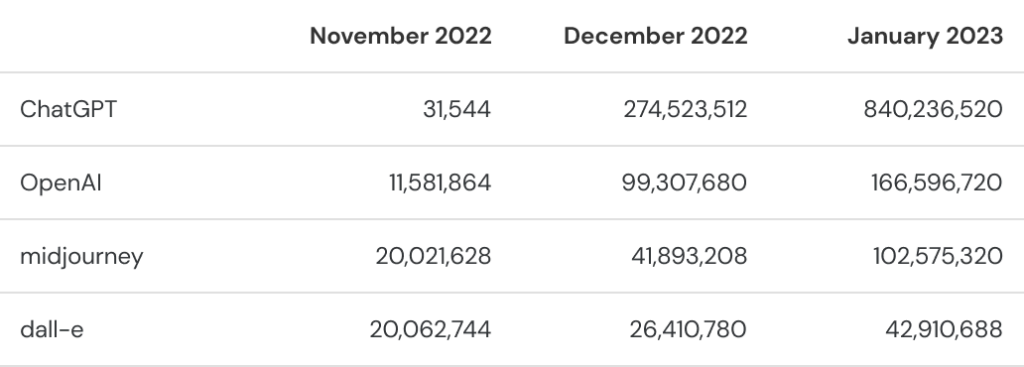ChatGPT has been called the fastest growing technology in history, reportedly taking a mere two months to hit 100 million monthly active users. In contrast, TikTok took nine months to reach that mark, and Instagram took a quaint 2.5 years.
But the impact of a new technology like ChatGPT on society is measured by more than downloads and users. Ultimately it will be measured by consistent use and its ability to disrupt categories and upending paradigms. In the near-term, one proxy for long-term impact is the extent to which it drives the national conversation. Is it in the press? Is it on formerly fast-growing apps like TikTok and Instagram? In other words, is it on people’s minds?
One way to quantify interest is to look at search behavior. It uniquely reflects the cultural and psychological hunger we have for information – often reflecting interest, ambition, anxiety, or a combination of the three. To assemble a relevant dataset, I worked with Datos – a global clickstream data provider focused on licensing anonymized, at scale, privacy compliant datasets. Their data offers insights into many aspects of digital behavior, including search, and they analyzed searches for ChatGPT and related terms over the past three months. The searches took place on Google and Bing, and took place in the United States and Europe.
The results are startling.
ChatGPT generated just over 30,000 searches in the month leading up to its November 30, 2022 launch, when only hard-core geeks and serious digerati knew of the brewing storm. In December, it was nearly a quarter of a billion. In January, over three-quarters of a billion. In growth terms, it grew 8700-fold in December, and then more than tripled off a huge base in January, for a total increase of over 27,000-fold – over 2.7 million percent.
Similar if less dramatic increases are seen for OpenAI, the company behind ChatGPT, which garnered 166 million searches in January, up from 11 million two months before. Also growing in search volume are dall-e (an image-focused offering from OpenAI that converts text prompts into images) and midjourney (a dall-e competitor that is both the name of the company and the name of the product).

A large percentage increase in searches for the name of a just-released product can easily be explained as an artifact of starting from a small base. Over 840 million searches in a month is not an artifact – it can only be explained as massive, widespread interest.
It is hard to find historical precedents of this magnitude of surge in search. TikTok took about nine months to surge as a search term, comparable to the time it took to hit the 100 million download mark. Instagram didn’t have a sudden surge, but rather grew consistently for nearly a decade. “Big
data” built momentum over the course of about three years, from 2011 through 2014. Perhaps Bitcoin is the closest parallel – spiking in December of 2017 as it hit its then-all-time high value of just over $20,000.
Whether ChatGPT wins the category, or becomes the MySpace to some as-yet-unknown FaceBook, remains to be seen. But with nearly a billion brand searches in just its second month, ChatGPT is launching into uncharted territory.
Note: The Google Trends charts shown are on different scales and time frames. They are not directly comparable to each other.
TikTok

Source: https://trends.google.com/trends/explore?date=today%205-y&geo=US&q=tiktok

Source: https://trends.google.com/trends/explore?date=all&geo=US&q=instagram
Big Data

Source: https://trends.google.com/trends/explore?date=all&geo=US&q=big%20data
Bitcoin

Source: https://trends.google.com/trends/explore?date=all&geo=US&q=bitcoin




